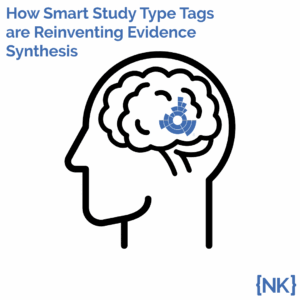
How Smart Study Type Tags Are Reinventing Evidence Synthesis
One of the features of Core Smart Tags is Smart Study Type – this refers to our AI system that automatically categorises the study type
Health technology assessments (HTAs) and health economics and outcomes research (HEOR) depend on timely, comprehensive evidence synthesis. Yet, traditional systematic reviews often take 6–12 months to complete. This is too slow for the pace of reimbursement decisions, price negotiations, and technology launches.
That’s where rapid reviews come in. By streamlining key steps in literature search, screening, and synthesis, rapid reviews enable stakeholders to maintain scientific rigor while accelerating insight delivery. Increasingly, HTA bodies, payers, and industry teams are recognizing the value of rapid reviews as a fit-for-purpose evidence synthesis model, particularly when supported by AI and automation.
At ISPOR Europe 2025, several research groups presented work demonstrating how AI methods, from natural language processing to retrieval-augmented generation, are reshaping evidence generation.
For example:
One team used EasySLR, an AI-assisted review tool, to compare machine-assisted and manual literature reviews, finding that discrepancies were minimal when human oversight was maintained.
Another group explored GraphRAG to simplify complex health economic models, showing that structured AI reasoning can accelerate insight generation.
Several HTA-focused studies highlighted how AI can automate data extraction, assist in evidence mapping, and even generate review outlines using generative AI
We were humbled to see that five posters show validations of Nested Knowledge AI across different review stages
The common conclusion? AI doesn’t replace expertise, it amplifies it. Reviewers retain control and validation, while automation reduces redundancy and time-to-insight.
Nested Knowledge unifies automation, collaboration, and transparency for rapid evidence synthesis. On the platform, users can conduct AI-assisted reviews that maintain the traceability and methodological transparency required for HTA.
Key features for rapid reviews include:
Smart Search & Deduplication: Accelerate study identification across multiple databases while preserving a full audit trail.
AI-Assisted Screening & Tagging: Whether with machine learning hybrid approaches or fully LLM-driven screening, save time (and maintain traceability)
Living Review Updates: Automatically track new publications, enabling continuous evidence monitoring and rapid refreshes for HTA submissions.
Integrated Visualizations: Generate PRISMA diagrams, forest plots, and evidence maps in real time, critical for both HEOR storytelling and regulatory documentation.
By combining automation with structured workflows, Nested Knowledge ensures that rapid reviews remain methodologically sound, reproducible, and ready for submission or publication.
As more AI-driven research appears in the HTA space, one message is clear: rapid, transparent, and reproducible reviews are becoming the new standard.
With Nested Knowledge, evidence teams can deliver that standard, balancing the urgency of decision timelines with the rigor expected by agencies like NICE, CADTH, and the EU’s JCA framework. The platform turns what was once a months-long process into an iterative, living, and collaborative review, aligning perfectly with the evolving needs of HEOR and HTA stakeholders.
Want to see how we do it?
Keep scrolling…
Yep, you read that right. We started making software for conducting systematic reviews because we like doing systematic reviews. And we bet you do too.
If you do, check out this featured post and come back often! We post all the time about best practices, new software features, and upcoming collaborations (that you can join!).
Better yet, subscribe to our blog, and get each new post straight to your inbox.

One of the features of Core Smart Tags is Smart Study Type – this refers to our AI system that automatically categorises the study type